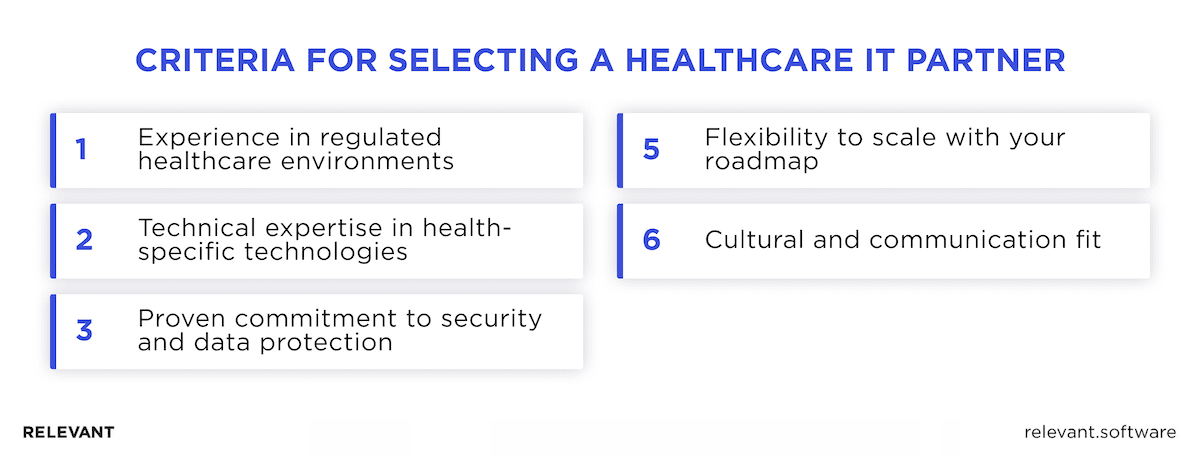Top 10 Healthcare Software Development Companies Transforming Digital Health in 2026

In some areas, software already outperforms specialists. AI tools now detect early-stage cancers more reliably than radiologists in controlled settings. Remote monitoring platforms help hospitals lower readmission rates by more than a third. Yet, across the industry, many care providers still rely on legacy systems that can’t integrate, don’t scale, and leave patients disengaged.
This disconnect creates real operational risk. With the global healthcare software market projected to reach $974.5 billion by 2027, digital infrastructure has moved from long-term ambition to immediate strategic priority. A recent HIMSS survey found that 78% of healthcare leaders intend to increase investments in healthcare software development services, focusing on tools that enhance day-to-day efficiency, ensure regulatory compliance, and enable value-based care models that deliver tangible results for both patients and providers.
from 25 countries outsourced software development to Relevant
We provide companies with senior tech talent and product development expertise to build world-class software.
So, selecting the right development partner now means choosing who will shape clinical pathways, secure patient data, and deliver measurable impact. This report presents the top healthcare software development companies leading that shift in 2026. Each has been evaluated for its healthcare domain focus, regulatory strength, delivery capacity, and proven outcomes in the field.
Comparison table: Top healthcare software development companies at a glance
To start, we’ve prepared a comparison table that gives you a quick overview of the top 10 healthcare software development companies. You can see their core areas of expertise, compliance certifications, primary operational hubs, industry ratings, and notable client engagements. This concise snapshot is followed by detailed profiles below.
| Company | Healthcare Expertise | Compliance Readiness | Core Locations | Rating / Recognition | Notable Clients |
| Relevant Software | Data analytics platforms, custom EHR modules, telehealth and mHealth apps, FHIR | HIPAA, GDPR, ISO 27001 | Ukraine, Poland, Spain | Clutch “Top B2B Company”; 4.9/5 | Astrazeneca, Ossur |
| Andersen | Patient portals, EHR/EMR, telehealth, AI diagnostics | HIPAA, ISO 13485 | Poland, US, Germany | 4.9/5 on Clutch | Siemens Healthineers, GSK |
| IT Craft | Healthcare mobile apps, mHealth & telehealth, wearable-device integration, EHR/EMR, HL7/FHIR & DICOM, healthcare modernization | HIPAA, GDPR, MDR, FDA; embedded in DevSecOps & audit-ready pipelines | Worldwide (USA, Canada, UK, Europe) | 4.9/5 on Clutch; 2,250+ projects delivered | Flexwise Health, Arctrieval, DRG Claims Management |
| Siemens Healthineers | Diagnostic imaging, laboratory automation, digital twin systems, and clinical decision support | HIPAA, GDPR, ISO 13485, HL7 | Germany, Global | $60 M+ “Value Partnership” deals (2024-25) | Tower Health (PA) |
| BairesDev | HIPAA-compliant apps, patient portals, insurance platforms | HIPAA, SOC 2 | Latin America, US | 4.9 / 5 on Clutch | Rolls-Royce, Adobe |
| Philips Healthcare | Remote patient monitoring, connected care, sleep & respiratory care, digital diagnostics | HIPAA, FDA (510 k), GDPR, ISO 27001 | Netherlands (Amsterdam HQ), USA, China, India | Listed among the 2025 top RPM vendors | Mayo Clinic |
| Innowise Group | Custom EHR systems, wearable integration, appointment scheduling, and medical CRM | HIPAA, GDPR, ISO 27001 | Poland, USA | 4.8/5 on Clutch | Novartis & CVS Health |
| NextGen Healthcare | Ambulatory EHR, RCM, patient engagement portals, interoperability solutions | ONC-certified; HIPAA / HITRUST hosting options | USA | Forbes “Best Midsize Employer” | Pacific Dental Services, Medical College of WI |
| Oxagile | HIPAA-secure telehealth & video-streaming platforms, AI triage | HIPAA, DICOM, ONC | Poland, USA | Clutch 4.9/5 | Panasonic Connect NA sports-video R&D partner |
| Kanda Software | HIPAA lab-management, predictive analytics, cloud EHR dashboards | HIPAA, ISO 27001, SOC 2 | Boston (MA, US) HQ; NY, CA, Costa Rica, EMEA | 4.9 / 5 on Clutch | Brigham and Women’s Hospital & City of Hope |
This list offers a high-level snapshot of the top healthcare software development companies leading the market in 2026. Before we examine each of the top healthcare software development companies in detail, it is important to understand what these firms actually do.
What do healthcare software development companies actually deliver?
Healthcare software development companies do more than build apps. They design digital systems that work within real clinical environments. Their services combine deep technical know-how with a working knowledge of healthcare workflows, compliance demands, and patient safety. The most capable teams typically offer:
- Custom healthcare software solutions: From EHR enhancements to custom patient platforms, top health tech companies build around each organization’s unique infrastructure, regulatory needs, and care models.
- Strategic IT consulting: Consultants structure interoperability plans, ensure full alignment with HIPAA and FDA rules, and define digital strategies that support growth while minimizing regulatory risk.
- Web and mobile development: Engineering teams deliver secure, responsive applications that connect healthcare staff and patients across platforms. These tools enable record access, appointment coordination, and streamlined care navigation while meeting strict privacy and performance standards.
- Telemedicine Infrastructure: Vendors install video consultation components within clinical platforms, alongside secure messaging, appointment coordination, and medical record sharing.
- Clinical platform engineering: Top healthcare software development companies deliver core operational systems such as lab management tools, imaging dashboards, and analytics engines for population health oversight.
- UI-UX design for clinical usability: Design teams craft interfaces that serve time-pressed physicians and non-technical staff; screens remain simple, responsive, and resistant to error.
- System integration: Specialists from leading healthcare software development companies integrate new and legacy platforms into a single, fully compatible environment, supporting HL7, FHIR, PACS, and other standards, while maintaining optimal performance.
- Built-in data security: Top vendors embed encryption, granular access controls, and full audit logging into the system from the start, so it’s HIPAA-compliant by design, not added in later.
- Ongoing monitoring and support: Top healthcare software companies stay engaged after delivery. They release updates, resolve issues, and ensure ongoing performance under changing regulatory conditions.
In short, healthcare software developers build infrastructure that supports care delivery, reduces administrative overhead, and aligns with the realities of modern compliance and patient safety.
Top 10 healthcare software development companies in 2026
This list features the top healthcare software development companies worldwide, recognized for their regulatory expertise, strong technical skills, and consistent delivery of enterprise-grade systems. From imaging and diagnostics to mHealth apps and precision medicine, each company profiled here has delivered real solutions that scale and perform in clinical environments.
Whether you’re seeking help with electronic health records, AI diagnostics, remote monitoring platforms, or compliance-driven infrastructure, these medical software development companies offer not only working software. They deliver measurable results.
Let’s look at what sets them apart.
1. Relevant Software
Relevant Software ranks among the top healthcare software development companies thanks to its strong mix of technical skills and deep understanding of healthcare delivery. With headquarters in Ukraine and additional hubs in Poland and Spain, the company supports hospitals, care networks, and healthtech startups across the U.S. and Europe. Over 92% of its engineers are senior or mid-level, giving clients direct access to experienced specialists from the start.
Healthcare focus & specialties: Healthcare software consulting, pharmacy management software, remote patient monitoring software, healthcare CRM, EMR/EHR software.
Key client work: Analytics modules powering U.S. community-health-centre networks, giving clinicians ad-hoc insight into quality metrics and revenue cycles
Why it stands out: Clients value Relevant Software for its senior-led teams, reliable budget control, and consistent delivery timelines. These strengths position the company as a top outsourcing firm for the healthcare industry, where precision, compliance, and speed are essential.
Latest innovation: Relevant Software built an AI-powered analytics platform for Highscale-Impact GmbH that turns complex procurement data into real-time, plain-language insights. The system now handles millions of records daily, giving hospital buyers and analysts instant answers without delays or SQL queries.
2. Andersen
Andersen is a global custom software provider with over 3,500 professionals. As a top healthcare software development company, they support medtech, diagnostics, and digital health firms with Software-as-a-Medical-Device, AI diagnostics, and IoMT connectivity – all built on compliance standards like ISO 13485 and ISO 27001.
Healthcare focus & specialties: Software as a Medical Device (SaMD), AI diagnostics, IoMT connectivity, imaging workflow engines.
Key case study: An AI platform that automated COVID-19 PCR-test validation for European labs, cutting review time by 40%.
Why it stands out: Brings together data scientists and FDA-trained quality engineers under one project team to speed up regulatory approvals for medical devices in the U.S. (510(k)) and Europe (CE marking).
Latest innovation: Computer-vision pipelines reading digital pathology slides at 98% sensitivity in internal benchmarks.
3. IT Craft
IT Craft has spent 25 years earning a reputation as a trusted partner in healthcare technology. With a team of 250+ specialists, the company provides its development services worldwide, including the USA, Canada, the UK, and Europe. IT Craft delivers secure and fully compliant software systems, and their end-to-end development process is designed to create reliable solutions that meet the specific needs of modern healthcare.
Core focus: Healthcare mobile app development, mHealth and telehealth solutions, wearable-device integration, EHR/EMR systems, HL7/FHIR and DICOM pipelines, healthcare solution modernization, healthcare IT consulting, DevOps, and cloud optimization.
Key case study: Flexwise Health: full-cycle development of a clinic workforce management system, transforming an on-demand nursing platform into a scalable HR solution with microservices, automated deployment, and optimized staff scheduling.
Why it stands out: IT Craft is recognized for its approach to solving business problems, attention to HIPAA/GDPR/MDR/FDA compliance, and exceptional source-code quality.
Latest innovation: Recent projects include cloud-ready EHR systems, scalable telehealth apps, and wearable integrations that improve efficiency and patient care.
4. Siemens Healthineers
Siemens Healthineers, a leading medical software development company, employs around 72,000 people and specializes in imaging AI (AI-Rad Companion), digital-twin systems, oncology analytics, and clinical workflow orchestration.
Core focus: Imaging AI (AI-Rad Companion), digital-twin modelling, oncology analytics, enterprise workflow orchestration.
Key case study: A 10-year “Value Partnership” with Tower Health achieved an 18% reduction in MRI idle time through predictive scheduling.
Why it stands out: Their AI-Rad Companion lineup includes over 40 FDA-cleared algorithms in production.
Latest innovation: Early results from the Tower Health programme show MRI-suite idle-time down 18% after twelve months, credited to usage-forecast algorithms.
5. BairesDev
BairesDev is a nearshore software development company with a growing footprint in the U.S. healthcare market. Headquartered in San Francisco and operating delivery centers across Latin America, the company supports medical providers and digital health startups with custom-built platforms designed to meet strict regulatory standards.
Healthcare focus & specialties: EHR add-ons, telehealth and remote care apps, healthcare analytics dashboards, HIPAA-compliant architectures, IoT-based monitoring tools.
Key case study: Gennev – BairesDev rebuilt the menopause-care platform’s DevOps pipeline, eliminating downtime and adding fail-over capacity.
Why it stands out: Fast team mobilization in two to four weeks, with compliance built directly into contracts and release cycles.
Latest innovation: Built an AI model that forecasts staff attrition with high accuracy. After reducing internal turnover by 50%, BairesDev adapted the tool for hospital workforce planning to help health systems preempt shortages and improve continuity of care
6. Philips Healthcare
As one of the best healthcare software development companies worldwide, Philips blends hospital and at-home care through its HealthSuite cloud and tele-ICU systems. With around 67,200 employees, they offer scalable solutions for remote patient monitoring, predictive diagnostics, and integrated imaging.
Core focus: Acute- and home-care monitoring, tele-ICU, imaging informatics, HealthSuite cloud platform.
Key case study: Saratoga Hospital cut ICU transfers by 63%after implementing Philips surveillance-level monitoring.
Why it stands out: Decades of experience with remote patient monitoring support an open system that sends data directly to any electronic health record (EHR).
Latest innovation: 2024 Future Health Index shows 41%of leaders plan AI-enabled RPM investments – Philips’ predictive models are already live in pilot networks.
7. Innowise Group
Innowise Group is a growing healthcare development company in Europe, with ~2,200 specialists. They build AR/VR-based medical training, wearable-device integrations, diagnostic AI, and cloud PACS solutions.
Core focus: AI diagnostics, VR/AR medical training, wearable-data integration, cloud PACS.
Key case study: A VR surgical-simulator project that increased a med-tech OEM’s device sales by 20% and cut buying-cycle time by 31%.
Why it stands out: one of the few mid-market vendors with a dedicated XR studio and ISO 13485 templates ready for client reuse.
Latest innovation: proprietary streaming engine keeps VR latency below 20 ms, eliminating simulator sickness in hospital trials.
8. NextGen Healthcare
NextGen Healthcare is a well-established healthcare software development company in USA, serving over 2,000 ambulatory and behavioral health providers. Their software includes EHR, billing, patient communication, and voice AI tools, all designed to fit U.S. healthcare rules and help clinics manage daily operations more easily.
Healthcare focus & specialties: Cloud EHR, revenue-cycle management, patient-engagement tools, ambient voice AI.
Key metric: NextGen Ambient Assist now powers 1.5 million encounters a year and saves clinicians up to two hours of documentation daily
Why it stands out: They stay up to date with U.S. healthcare rules (like ONC and CMS) and offer ready-made templates for different specialties, so system upgrades are smooth and don’t cause disruptions.
Latest innovation: Launched Gen-AI summarisation capabilities in 2025 that reduce post-visit charting by 30%, improving workflow efficiency without compromising accuracy.
9. Oxagile
Oxagile ranks among the top healthcare software development companies for its deep specialization in real-time video engineering and population health platforms. With over 500 experts across eight delivery hubs, the company helps healthcare providers launch HIPAA-compliant telemedicine tools and analytics systems that perform under clinical load. Oxagile’s telehealth framework supports secure video consultations, AI triage, and RPM at scale.
Core focus: WebRTC-based telehealth, video analytics for diagnostics, HIPAA data lakes, BI for population health.
Representative work: Turnkey telemedicine framework enabling secure, low-latency video consultations and scalable RPM, spotlighted on its telehealth competence page.
Why it stands out: 17 years of video-streaming IP translates into 99.99% call uptime under clinical load.
Latest innovation: Auto-scaling STUN/TURN clusters cut cloud spend by 40% versus static provisioning.
10. Kanda Software
Headquartered in Boston with engineers in Eastern Europe and Latin America, the 850-person team builds complex healthcare software such as precision oncology platforms and lab information systems, where data security, speed, and scientific accuracy all matter at the same time.
Core focus: Precision-medicine platforms, lab systems, HIPAA dashboards, AI-driven population analytics.
Key case study: Migrated Trapelo’s real-time oncology platform to HIPAA-compliant AWS, enabling 3× traffic scaling without downtime
Why it stands out: AWS Healthcare Competency plus 30 years of HIPAA projects; Gold and Silver Globe tech awards in 2024.
Latest innovation: AI tools that analyze medical records and research have helped improve treatment safety by 15% in pilot clinics.
This list highlights the best healthcare software development companies that deliver more than just code. They develop secure, compliant, and future-ready healthcare software that boosts satisfaction across the healthcare sector. Whether your organization seeks top healthcare development companies for regulatory support, AI-driven analytics, or telehealth expansion, these vendors offer scale, specialization, and proven outcomes to match real-world clinical goals.
In the next section, we examine the key factors that distinguish reliable healthcare software developers from the rest and why these choices will become increasingly strategic in the years ahead.
What to look for in a healthcare software partner
Selecting a healthcare software development partner is a strategic decision, not a procurement checkbox. It affects everything from operational efficiency to compliance exposure and long-term scalability. In 2025, the best healthcare development companies are those that treat software not as a digital product, but as clinical infrastructure. Here’s what separates them.

Experience in regulated healthcare environments
Building HIPAA-compliant systems is table stakes. What matters is a documented ability to deliver software that clears security audits, supports MDR/FDA submission processes, and goes live without budgetary or legal surprises. Top-tier healthcare software developers will walk you through case studies where software withstood real regulatory scrutiny under tight timelines.
Technical expertise in health-specific technologies
Experience in .NET or React means little without knowledge of HL7 v2, FHIR standards, DICOM protocols, or payer-provider data exchange. The best medical software development companies bring a working understanding of EHR architectures, clinical workflow logic, and health data ontologies. They build systems that integrate cleanly and function under real-world data volumes.
Proven commitment to security and data protection
Data protection is not a feature you can neglect. The most capable healthcare development companies embed encryption, fine-grained access control, intrusion detection, and disaster recovery into their standard delivery frameworks. A serious vendor will already offer Business Associate Agreements, not draft one after contract signature. Security architecture should be transparent and audit-ready from day one.
Flexibility to scale with your roadmap
Software teams must evolve with market demand, clinical validation cycles, or institutional scale. Leading healthcare software companies offer responsive delivery models that expand or contract without compromising seniority, velocity, or system continuity. If your product roadmap depends on speed and discipline, the vendor-side team structure must match that rhythm.
Cultural and communication fit
Even the most technically sound partner fails when internal collaboration breaks down. A suitable healthcare IT solutions company will have clear escalation paths, transparent progress reporting, and product managers who understand the stakes, not just the sprint. Communication clarity and decision autonomy must match the complexity of your product and your governance standards.
Whether you’re searching among top medical software companies for a long-term innovation partner or exploring healthcare IT solutions companies for a time-sensitive deployment, these criteria will help you avoid costly missteps and build for sustainable success.
Final thoughts: choosing the right healthcare software development company
Selecting a software development company for healthcare isn’t a branding exercise. It’s a strategic decision that affects how clinicians work, how patients engage, and how risks are managed across your system. The strongest vendors offer more than just engineering talent. They understand the healthcare industry, operate with discipline, and have proven their ability to deliver software that performs reliably in real-world settings.
Look for those who work with clinical data on a daily basis. Who’ve built HIPAA-compliant platforms, passed audits, integrated with EHRs, and stayed ahead of evolving regulations like FHIR or MDR. Ask what they ship, not just what they promise. Ask for specifics: what the codebase looks like six months after launch, how they manage test coverage, and how product decisions are made.
A capable partner won’t need to exaggerate. Their results will speak clearly — faster onboarding, fewer production issues, lower rework rates, stronger security posture.
If you’re looking over options now, you can use this list as a reference point. Each vendor featured here has demonstrated the ability to navigate healthcare’s technical and regulatory complexities while delivering software that drives meaningful outcomes. You can choose the one that best aligns with your product, process, and pace. The cost of getting it wrong is too high to treat this as a routine procurement.


Hand-selected developers to fit your needs at scale! Let’s build a first-class custom product together.

